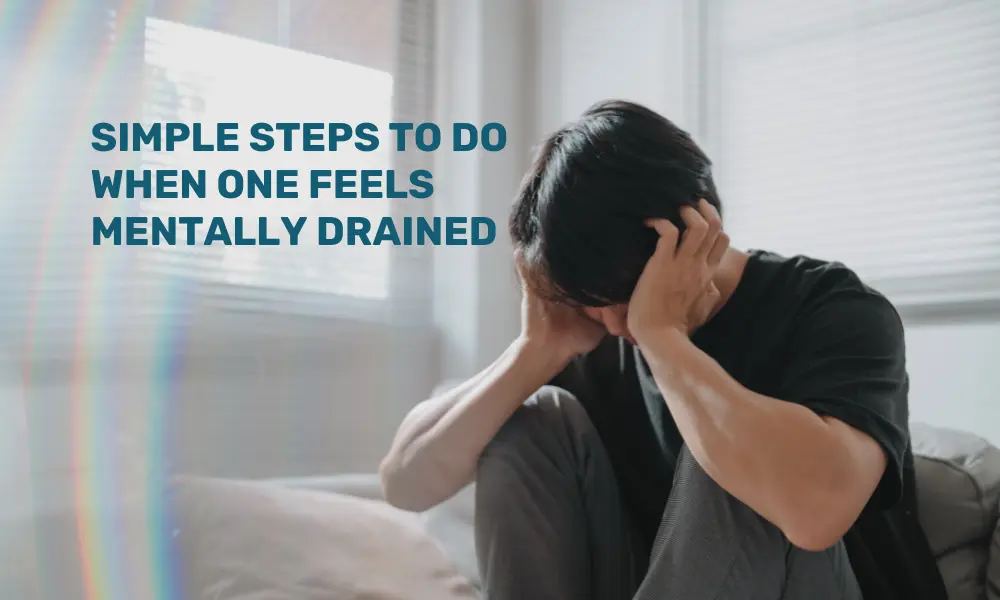There are days when we all struggle to balance multiple things and remain calm at the same time. There may be times when we may feel clustered, find it difficult to concentrate, and even the simplest tasks may seem overwhelming. These signs may actually indicate that an individual is mentally drained and stressed.
By identifying the signs of mental strain and fatigue, one can take preventive steps toward resolving the stress and feel more productive and energized.
How does mental exhaustion or being mentally drained affect our overall health?
Mental exhaustion can cause certain physical symptoms like back pain, headaches, muscle tension, sore muscles, stomach problems, and sleep disturbances. You might also experience changes in appetite and weight, frequent illnesses, and a general sense of unwellness.
What does being Mentally Drained or Mentally Exhausted mean?
Mental fatigue or mental exhaustion often arises from prolonged stress, excessive multitasking, or lack of rest. Mental strain can result from high levels of cortisol, the stress hormone, which affects cognitive functions like memory and concentration. Chronic stress and overworking the brain often can lead to feelings of exhaustion and an overall sense of mental drain. This article highlights how to deal with mental exhaustion.
How to cure mental exhaustion?
Mental exhaustion or feeling mentally drained is not good for our overall well-being. Here are six ways to relax and refresh your brain:
Healthy nutrition: Eating a balanced diet significantly affects brain health. Nutrients like antioxidants, omega-3 fatty acids, minerals and vitamins support cognitive function and reduce inflammation. Incorporating nutrient rich food in our daily diet can help improve mental exhaustion and reduce feelings of fatigue. Therefore, having healthy food is vital.
Good sleeping pattern: Sleep is not just a luxury, it’s basic necessity for our cognitive health and mental recovery. Inadequate sleep can lead to cognitive impairments and increased stress levels. When you get sufficient quality sleep each night, it helps consolidate memory, restore mental energy, and improve brain function, allowing you to wake up feeling refreshed and ready to take on the day.
Meditation: One of the most powerful tools for reducing mental fatigue is meditation. Studies suggest that regular meditation can help reduce cortisol levels and improve brain function by enhancing mindfulness and reducing stress. A daily practice of just a few minutes can help clear our minds, reduce anxiety, and refresh our cognitive abilities.
Physical exercise: Physical activity helps boost brain function by increasing blood flow and releasing endorphins. Regular exercise or being physically active can improve cognitive performance and reduce symptoms of mental fatigue by improving mood and energy levels. Even a short walk can help rejuvenate our brain and enhance focus.
Mindful breaks: Taking mindful breaks throughout the day helps manage stress and prevent burnout. Short, intentional breaks allow your brain to reset and recover, improving your productivity and mental clarity. Add brief periods of relaxation or engage in a hobby to give your mind a much-needed rest.
Breathing Exercises: Deep breathing exercises can help calm the nervous system and reduce stress. Research shows that slow, deep breathing techniques can activate our nervous system, which in turn helps lower heart rate and blood pressure, alleviate feelings of mental strain, and promote relaxation.
Being mentally drained can impact our productivity and overall health. Above ways can help us manage and control the mental exhaustion but additionally consulting a professional can be helpful to deal with mental stress. Click Here to Consult a Specialist.
FAQ on Mental Exhaustion
How do you manage Mental Exhaustion?
One must identify the factors that cause mental exhaustion, control these factors, and reduce stress.
How to rest your brain?
Our brain needs rest too. Try to relax and take small breaks during the day, avoid over thinking and one must have a good sleep of minimum seven to eight hours.
How do you reduce mental fatigue?
-
Eating a balanced diet
-
Deep breathing exercises
-
Meditation
-
Physical Exercise
-
Take mindful breaks
-
Sufficient Sleep





